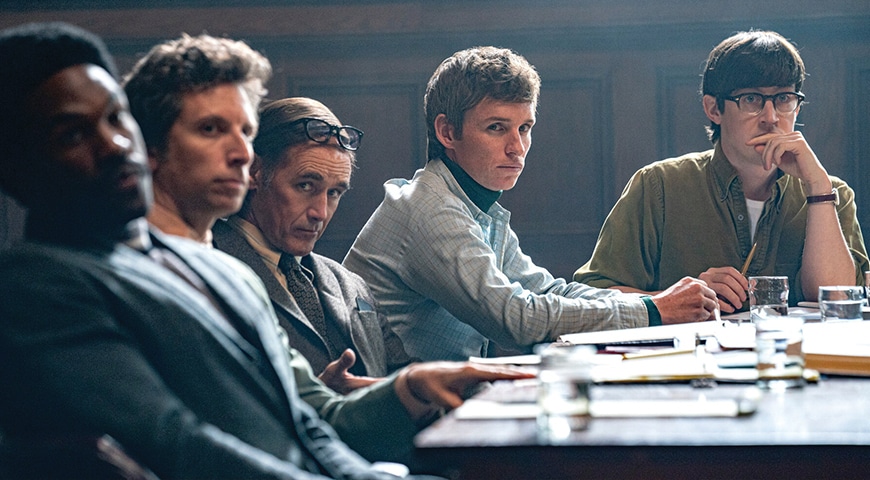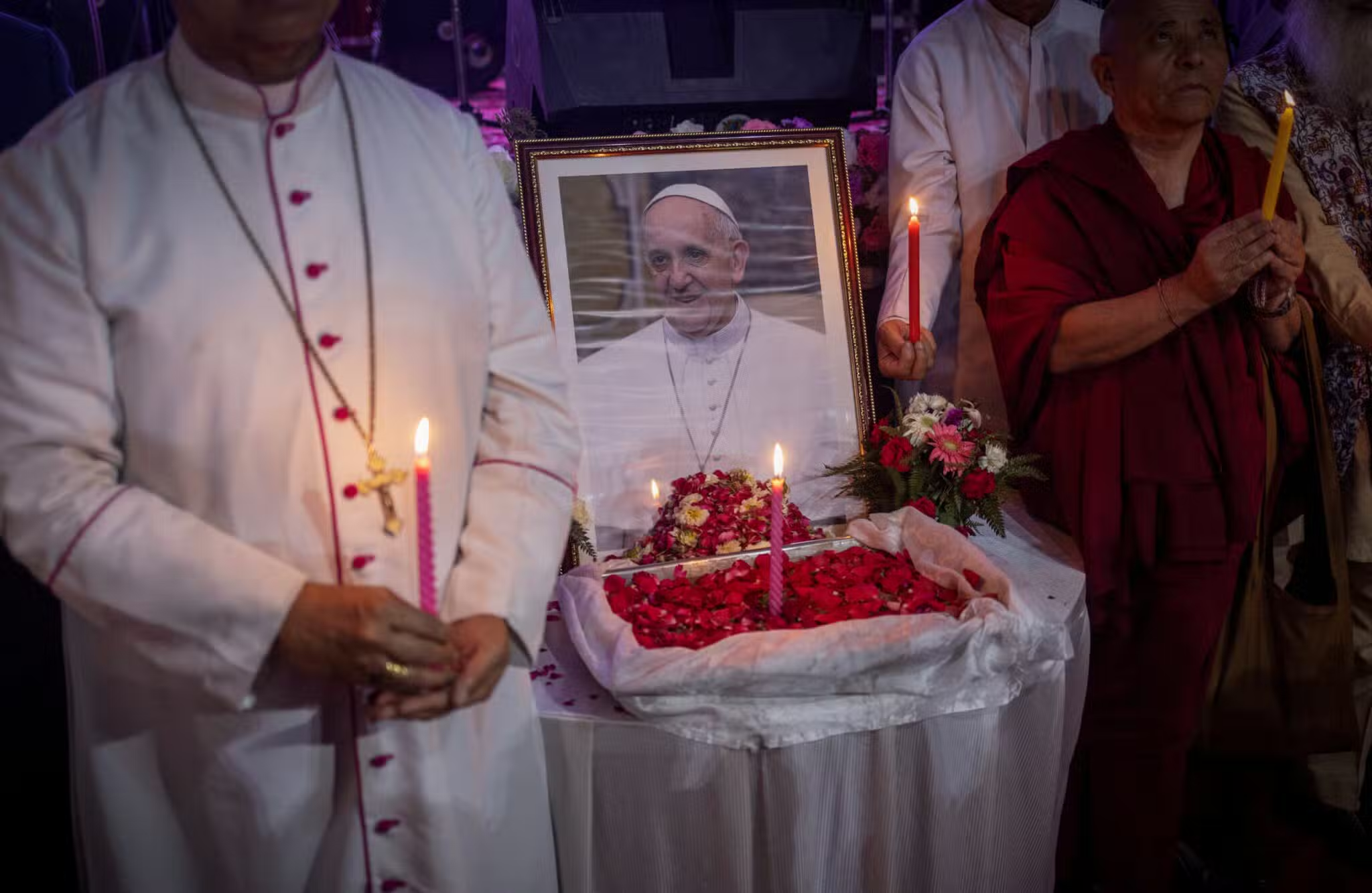The Trial of the Chicago 7
Writer-director Aaron Sorkin’s latest film, streaming on Netflix, is deeply felt historical theater on parade. It’s been more than 50 years since the events portrayed took place, but the story still resonates as it engages audiences about democracy, the judicial process, and the illegitimacy of the Vietnam War.
We meet the mismatched but dedicated group of protesters who want to be seen and heard as the death count of American soldiers in Vietnam mounts. Yippie anti-Vietnam protester Abbie Hoffman (Sacha Baron Cohen); his pal Jerry Rubin (Jeremy Strong); preppy Tom Hayden (Eddie Redmayne), cofounder of Students for a Democratic Society; Boy Scout leader David Dellinger (John Carroll Lynch); Lee Weiner (Noah Robbins); John Froines (Danny Flaherty); and Rennie Davis (Alex Sharp) go to Chicago to peacefully protest the war during the 1968 Democratic National Convention. They beg the Chicago Police Department to prepare for possible unrest but are ignored. They apply for and receive permits to rally and march.
When a riot breaks out, the seven are arrested for conspiracy, along with Bobby Seale (Yahya Abdul-Mateen II), the leader of the Black Panthers. The trial comes down to who started the riot (the protesters or the police?) and what is on trial (the protests or the ideas behind them?).
Sorkin’s gift is his ability to make sense out of a complicated trial. William Kunstler (Mark Rylance) looks disheveled but represents the seven men without care for his own well-being. Bobby Seale’s attorney never shows up, and Seale is eventually granted a mistrial based on the judge’s racial bias. Judge Julius Hoffman (Frank Langella) rules his courtroom with an iron fist rather than with objectivity or understanding and lets it be known that he disapproves of the men and their ideas.
Sorkin provides insight into the personalities of those on trial (four of them, anyway; three are left underdeveloped). The role of the federal government becomes clear when former Attorney General Ramsey Clark (Michael Keaton) is asked to testify on behalf of the defense.
Once the trial starts, the film becomes a terrific courtroom drama. The conversations between Abbie Hoffman and Hayden are brilliant. The acting is superb, and the bad ’60s haircuts and styles are realistic. The Trial of the Chicago 7 has something to say about nonviolence, police brutality, and politics—and may launch conversations about judicial reform.
A-3, R, Rioting, violence, racial prejudice, language.
Boobs: The War on Women’s Breasts
Documentarian Megan Smith, whose husband died of cancer 11 years ago after he chose to adhere to the accepted “standard of care,” decided to make a film about his story and question the meaning of “standard of care” used in US health care. During the process she learned about mammograms, the accepted standard of diagnostic care to screen for breast cancer, and decided that this was a film that urgently needed to be made. Why the title? To grab the attention of women so they could learn about problems with mammography that were not reported and “the myths we are being told.” The film does not cover all the issues; she is following up with a book.
The problem begins with clinics not being obliged to notify women that they have dense breast tissue; then when radiologists notice density, they automatically increase the amount of targeted radiation on the breast without telling the patient. Today, 38 states mandate that clinics notify women when they have dense tissue, but patients end up going back for more mammograms and more radiation without being told about the risks. The FDA is supposed to regulate mammography, but any monitoring of the amounts of radiation women receive is minimal.
Through interviews with doctors who use nontraditional diagnostic tools such as thermography in combination with ultrasounds, Smith tells us that there are safer ways to detect cancers without repeated radiation. However, since the 1980s, mammograms have become a multibillion-dollar-a-year business, and insurance companies often will not pay for any other diagnostic procedures.
This film is important and unique, and the information provided is compelling. It is like watching a PowerPoint presentation on film because every fact stated or revealed comes with the reference for the research. Smith hopes that women will become aware about what mammography is doing to their bodies and ask doctors for alternative, safe diagnostic procedures that are much cheaper than a mammogram.
Not yet rated, Medical views of mammograms.
Over the Moon
Fei Fei (voice of Cathy Ang) lives happily with her parents in a small city in China. As they prepare mooncakes for the Mid-Autumn Festival, Mother (Ruthie Ann Miles) tells her stories of Chang’e (Phillipa Soo), the goddess who lives on the moon, forever mourning her intended husband, the warrior Houyi (Conrad Ricamora), who died. Father (John Cho) looks on his family with love but is shaken when Mother dies. Four years later, when the lovely Mrs. Zhong (Sandra Oh) shows up with her annoying son, it becomes evident that they will soon become a blended family. Fei Fei resists.
Fei Fei, who loved Mother’s stories, has become interested in science. She thinks if she can make a rocket and go to the moon, she will prove to Father that Mother’s love is eternal because the moon goddess is real. After quite a journey, Fei Fei learns that if you can love another, love only grows.
Over the Moon is a beautifully crafted animated musical from Sony Image Works and streaming on Netflix, directed by Glen Keane and written by Audrey Wells. Traditional Chinese instruments are used throughout, and one of the songs is in English and Mandarin. Much effort was made at authentic representations of Chinese architecture and customs, with the family at the center.
Not yet rated, PG, Loss, death, grief.








